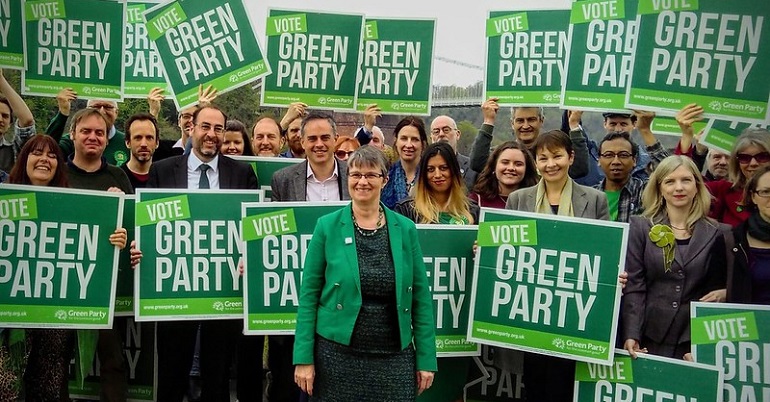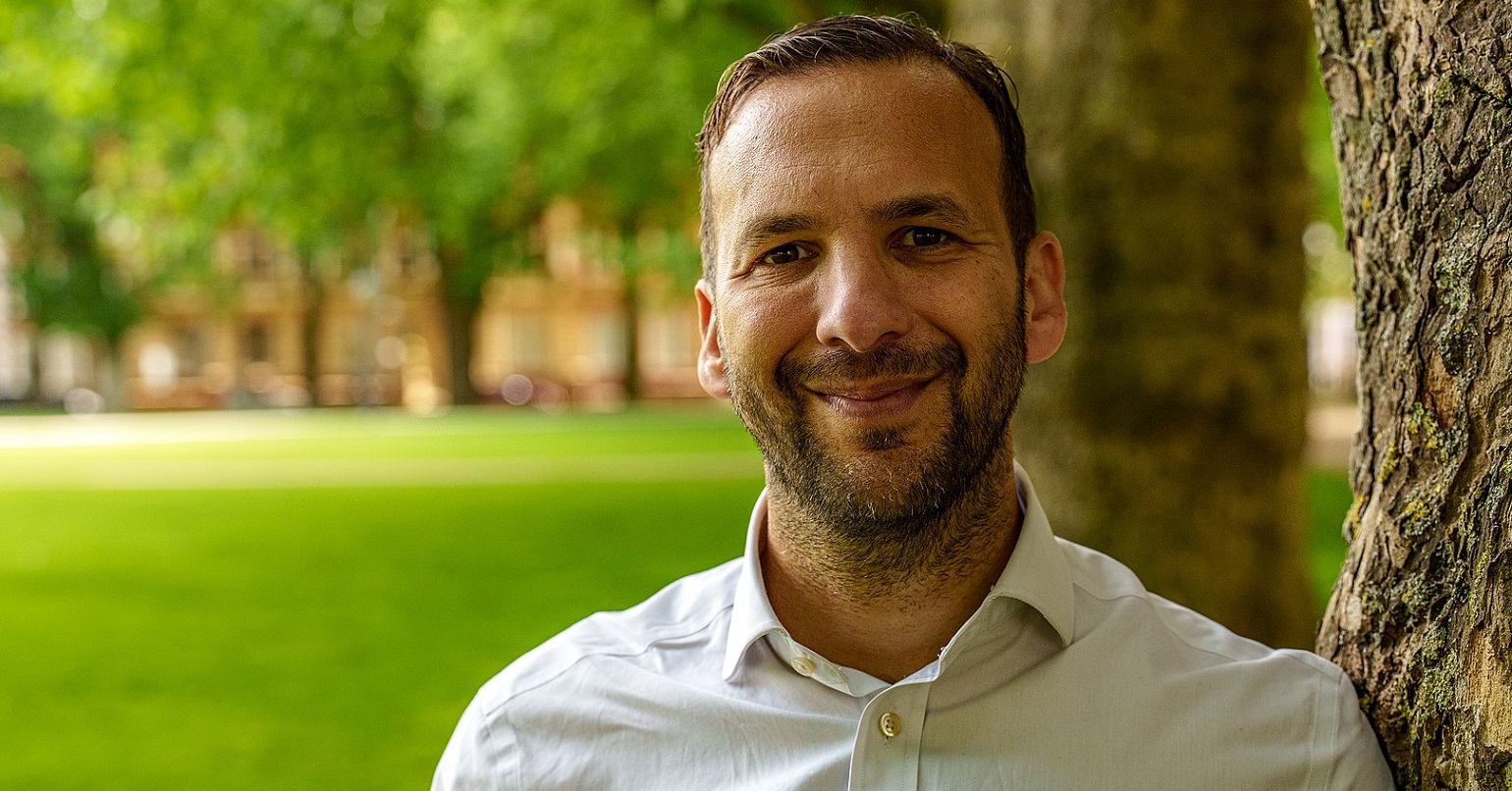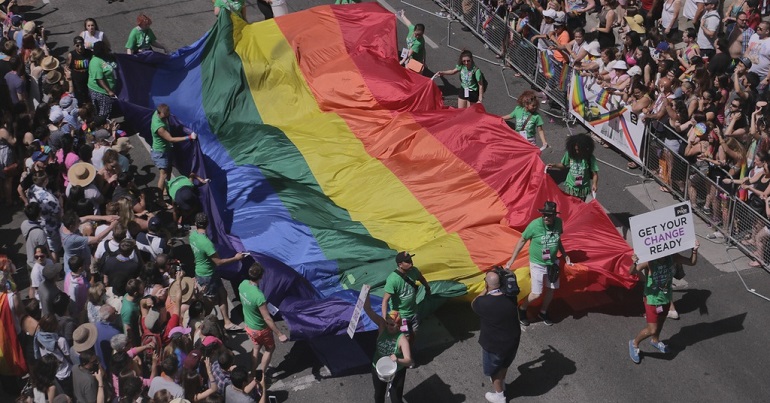Who could be the next deputy leader of the Green Party?

The Green Party of England and Wales typically elects its leadership team every two years, with members voting for both the leadership and deputy leadership concurrently. The last scheduled election took place in 2020, meaning we are due another one this summer.
But this year, things are a little different. Because of Jonathan Bartley’s resignation in July 2021, a leadership by-election was held in the Autumn last year. Due to that by-election being held outside of the usual cycle, the victors – Carla Denyer and Adrian Ramsay – will be serving until 2024, adding an extra year to their term in office. So this year it’s just the deputy position up for grabs.
In March 2022, Amelia Womack announced that she wouldn’t be seeking re-election as deputy leader of the Green Party. That news was significant. Not just because she has served in the role for eight years, over which time the Greens have achieved unprecedented electoral success and have experienced a major growth in membership. But also because it will mean this year will be the first time in a decade that a deputy leadership election will take place without an incumbent in the running. It’s a completely open field.
Nominations for the election will open on June 1. And we can expect a flurry of announcements from the runners and riders in the coming days and weeks. Before these come in, Bright Green is breaking down who you can expect to put their name forward.
The definitely nots
Let’s get the easy ones out of the way first. There are some high profile Greens who have been touted for leadership positions in the party, but who won’t be standing this time around.
First, there’s Rosi Sexton, a Councillor in Solihull who was the runner up in the 2020 leadership contest. Sexton ran an impressive campaign, which galvanised support from disparate wings of the party – local government liberals, equalities organisers and some portions of the left – through a campaign focussed on inclusion, opposition to electoral alliances and taking a big leap forward in elections. Naturally her name would come up in conversations about potential contenders for this year’s deputy election. Sexton has, however, been ruled out by default. In February, she left the party over what she described as its failure over the handling of sexual harassment allegations.
Another name that has come up is Hannah Clare. Clare is currently deputy leader of Brighton & Hove Council. In that role, she has developed a strong reputation for standing up to the government on major issues such as school closures during the Covid-19 pandemic. She is also well regarded for her handling of the Green Group’s external communications. When the Greens ran Brighton & Hove from 2011-15, they gained a reputation for blunders and infighting, but the current administration – in office since 2020 – have not been plagued with the same perceptions. Those hopeful that she could translate these experiences into the leadership team will be disappointed. She has ruled herself out, confirming that she won’t be in the running this year.
The strong rumours
With those who are definitely not in the running out of the way, it’s time to look at those who are rumoured to be putting themselves forward. There are at least three people who are strongly rumoured to be considering throwing their hat in the ring.
The most high profile of these is Zack Polanski. Rumours have been circulating among members in recent weeks that Polanski has been considering standing for the deputy leadership, and Bright Green understands that he does intend to enter the race. Having only joined the Greens in 2017, Polanski’s rise to prominence has been as rapid as it has been impressive. In 2021, he was elected as the Greens’ third member of the London Assembly, joining Sian Berry – the party’s then co-leader – and Caroline Russell. Since his election, he has come to be known for his strong media performances, particularly when going head to head with LBC’s Iain Dale, and for his deft chairing of plenaries at the party’s painful online conferences. Initially, Polanski was regarded with suspicion by some on the party’s left flank for his brief time as a member of the Liberal Democrats. He has since gone some way to shake this impression through his work on the London Assembly, not least through his demonstrations of solidarity with striking care home workers and the United Voices of the World trade union. Given his profile, Polanski would be entering the election as one of the favourites.
Polanski isn’t the only Londoner thought to be among the potential candidates to enter the contest this year though. Bright Green understands that Tyrone Scott has been considering standing too. Scott was one of the Greens’ candidates in Dalston in this year’s elections to Hackney Borough Council. While his co-candidate Zoë Garbett was elected, Scott fell short. Outside of electoral politics, Scott is known for his public campaigning, particularly around housing issues and on climate justice. On the latter, Scott’s most high profile moment came at the close of the COP26 summit in Glasgow. Attending the conference as a delegate for the Federation of Young European Greens, Scott disrupted its final moments, storming the stage and declaring “COP26 has been a failure” before Alok Sharma was due to announce the deal that had been agreed.
The third contender thought to be contemplating putting in a bid for the deputy leadership is Kathryn Bristow. Bristow was co-chair of Green Party Women from 2020-21, and previously served on the Greens of Colour committee. In 2021, Bristow was the first out trans woman to be put forward as a candidate in Bristol City Council’s elections, but received a no-fault suspension from the party before the election took place. That no-fault suspension was in light of a complaint from another member and related to Bristow Tweeting that fae would state faer gender as female on the census. Bristow – whose suspension has been lifted – has since alleged that it showed the party “deemed [faer] a risk to the party’s reputation for being transgender”.
The potentials
Polanski, Scott and Bristow are the three most likely contenders at this stage. However, there are a number of other members who could well enter the running in the coming weeks.
Vix Lowthion is currently the Green Party’s education spokesperson, and serves on the party’s executive as Policy Development Coordinator. Alongside this, she has been a three time parliamentary candidate on the Isle of Wight, where she received over 15 per cent of the vote in the 2017 and 2019 general elections. Long rumoured to have leadership ambitions, Lowthion decided against standing in previous contests. However that might not be the case this year. Bright Green understands that she has not ruled out a bid for the deputy leadership. With a national profile and a reputation as an affable communicator, were Lowthion to put her name forward she would be consider a frontrunner from the off.
Another potential frontrunner is Cleo Lake. Lake stood for the deputy leadership in 2020, coming second to Amelia Womack. That election was closer than many anticipated, with Lake finishing just 700 votes behind Womack. Her campaign was marked by powerful rhetoric, metaphor-ridden stories and a critique of the party’s failure to select working class people and people of colour as target candidates. Lake first came to prominence during her term as Lord Mayor of Bristol. In that role, she was a major player in the movement to address the city’s legacy of slavery, and had a portrait of the slaver Edward Colston removed from her office, the same Colston whose statue would be toppled in 2020. With a strong second place already under her belt, Lake would be a formidable contender should she decide to stand.
Finally, there is Shahrar Ali. For the last five times party members have voted for a leader or deputy leader, Ali has been on the ballot paper. He first stood for deputy leader in 2014, becoming the first person of colour to be elected as a deputy leader of a major political party in the UK. He served for two years alongside Amelia Womack before losing his bid for re-election in 2016. Since, he stood for the leadership in 2018, 2020 and 2021, picking up around a fifth of the first preference votes in each contest. Over that time, he also served as the party’s appointed spokesperson for home affairs and for policing. Earlier this year, he was removed from his spokesperson role due to what the Chair of the party’s executive said were “breaches of the Speakers’ Code of Conduct”. In recent years, Ali has become known for his comments on trans rights, which have attracted substantial criticism from other members. As a result of his removal and the criticism he has experienced, he currently has a legal claim lodged against the party over what he alleges is “unlawful discrimination, harassment and victimisation for daring to express my gender critical views”. Ali is known as one of the best orators among the Greens’ ranks, and having garnered relatively high levels of support in previous leadership contests, he would be a contender to watch should he put himself forward for the deputy role this year.
The long shots
Of course – these elections are never predictable – it is quite common for candidates to come out of the blue. Presently, the party’s election rules set an incredibly low bar for candidates to make it onto the ballot paper. To get there, a candidate needs to have been a member for three years and to receive nominations from just 20 other members. With a nomination threshold so low, there theoretically could be over 2,000 candidates in this year’s election. So there are plenty of other people who could put their names forward.
These come in three major camps. First, those who have stood for leader or deputy previously. Second, those who hold or have held major public office. And finally, those among the now 550 strong crop of Green Councillors across the country.
In the 2021 by-election, there were five leadership and co-leadership tickets. Carla Denyer and Adrian Ramsay were elected as co-leaders. Amelia Womack has ruled herself out. Shahrar Ali we have discussed earlier. That leaves four people across three of the 2021 tickets still to cover. First, Womack stood jointly with the climate activist and author Tamsin Omond. Omond left the Greens in March 2022, citing transphobia in the party as the reason for their departure. So they are out. Then we have Martin Hemingway and Tina Rothery – who also stood on a co-leadership ticket in 2021. They received just 3 per cent of the first preference votes in the election, and with limited evidence of support, it seems unlikely either would opt to stand for the deputy leadership this time around. Similarly, Ashley Gunstock picked up just 1.8 per cent of first preference votes after a gaffe-ridden campaign. Gunstock running this year doesn’t seem to be on the cards.
A year prior, there were three candidates in the deputy leadership that we haven’t yet covered here. Two of them – Tom Pashby and Andrea Carey Fuller have since left the party. The third, Nick Humberstone, remains in the Greens and came extremely close to being elected as a Councillor in Lewisham in this year’s local elections. Humberstone received 4.3 per cent of the vote in the 2020 deputy leadership contest, so doesn’t have a bedrock of support. But following that election, he said that he would be standing again in 2022, “hopefully”, so don’t rule it out.
There are many, many other people who have previously unsuccessfully stood in leadership or deputy leadership elections, some of whom could come out of the woodwork and give it another go this time round. The two of these who have retained something of a profile since they last stood are Kirklees Councillor Andrew Cooper and the party’s current equality and diversity coordinator Rashid Nix.
When it comes to those who hold or currently hold major public office, a few names spring to mind. Firstly, the party’s cohort of former MEPs. There are plenty to chose from here, but the three most recognisable faces – Molly Scott Cato, Magid Magid and Alex Phillips – are also probably the most unlikely. Scott Ainslie, Gina Dowding and Ellie Chowns are all currently Councillors, and Catherine Rowett is the party’s work, employment and social security spokesperson. Any of these seven standing – or indeed the Green MEPs from the pre-2019 era – would be a big surprise, but equally they would be instantly in the running as favourites if they did defy expectations and decide to give it a go.
We then come to the very, very unlikely scenario in which one of the current major office holders gives it a go. We are now into household name territory, and in the realm of people who would completely alter the shape of the contest were they to stand. The chances of the Carolines (Lucas and Russell) and the Lords (Jenny Jones and Natalie Bennett) standing are extremely low, but stranger things have happened.
And then we come to the now ballooning group of Green Councillors. As of this week, there are now 550 of these, so there’s lots of scope for wildcard candidates to emerge. What we can expect is that there may be candidates from different camps in the party coming forward from this group.
One camp is on the more liberal wing of the party. That’s the wing that got squarely behind Rosi Sexton’s 2020 leadership bid and has substantial representation among the Greens’ local Councillors. Many of their key players are now coalescing in other formations within the party, through initiatives like Greens4HS2 and Greens for Nuclear Energy*, while maintaining strong public support for the party’s policies on issues such as trans rights. If a candidate from this camp steps forward, expect to see a platform which talks extensively about equality and diversity, target to win campaigning and evidence based policies with credibility among experts.
The second camp is the party’s left – often seen through its younger Councillors, many of whom were elected for the first time in 2019, 2021 or 2022. There are a few among this number who have a reasonably sizeable public platform, including the party’s migration spokesperson Benali Hamdache who was recently elected as a Councillor in Islington. While Bright Green understands that Hamdache is not currently considering running for the deputy leadership, don’t rule out a bid from others of his ilk. If a left Councillor were to stand, you can expect their platform to be equally as staunch in their support for policies on equalities issues as the liberals, but combined with a focus on the need for a transformative economic agenda and a strengthening of the relationship between the Green Party and social movements and trade unions, with a complete bingo card if they mention eco-socialism.
A long way to go…
Nominations for the deputy leadership don’t close until Midday on June 30. So we have around five weeks until we know the final list of candidates. Following that, there will be a long campaign period, with members casting their votes over the summer. A lot can change between now and then. The only thing we know for certain is that for the first time in many years the election is wide open, and that there are a range of people who could take up Amelia Womack’s mantle.
Throughout the election campaign, Bright Green will be providing detailed news, interviews and analysis. If you value this coverage and want to support what we do, please donate today.
*Author’s note. For clarity, I am not suggesting that support for HS2 or for nuclear energy is in itself a liberal position. Instead, this is an observation that many of the members on the liberal wing of the party are active supporters of and participators in these groups.
Image credit: Bristol Green Party



I will be voting for a female (woman or man), females are under represented in power and I belive in equality. We should have equal numbers of male and female in every institution. Biology is important.
Not entirely certain how you are defining “liberal wing”. Please feel free to expand on this if you have time.